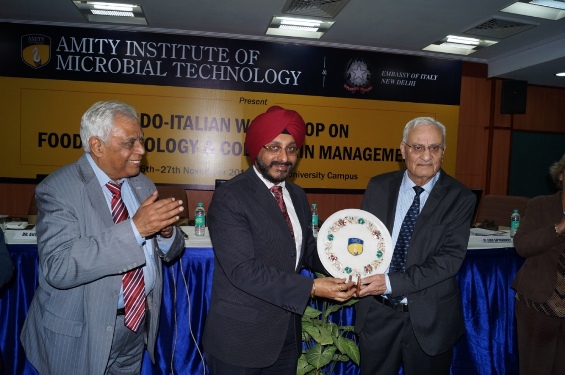26 Nov 2014|Noida | F1 Seminar Hall
Microbes play a vital role in the advancement of food quality and production, opine Food Scientists during two-day Indo-Italian workshop on Food Technology and Cold Chain Management at Amity University

Amity University in association with Italian Embassy started a two-day Indo-Italian workshop on ‘Food Technology and Cold Chain Management’ at Amity Campus Sector 125 Noida. The aim of the workshop is to provide a forum to discuss the latest developments in Scienceand Technology related to Food Loss, Productivity, Processing, Value Addition and Cold Chain.
The workshop is attended by more than 200 students, academicians, young scientists and research scholars who would get an opportunity to exchange their views and develop future research collaborations. More than 75 Research Papers from across the globe would be presented during the workshop.
The event was inaugurated by ChiefGuest of the occasion, Prof. (Dr.) K L Chadha, former DDG Horticulture ICAR; Dr Lidia Szpyrkowiez, Scientic Counsellor, Italian Embassy; Prof. Pietro Tonutti,Scoula Superiore San’ Anna, Pisa, Italy; Dr. Ajit Varma, Distinguished Scientist & Professor of Eminence, Amity Institute of Microbial Technology;Dr. Gurinder Singh, Additional Group Vice Chancellor, Amity and Dr. Upinder Dhar, Group Addl Pro Vice Chancellor, Amity.
Welcoming the participants, Dr.Ajit Varma said that at present, various Scientists, Researchers and Technologists are working hard on various aspects of food industry to develop innovative ways of food processing, productivity and management. He further added that the workshop is a right forum to discuss the role of microbes ingrowing food and providing insight into applied research for food production,preservation and subsequent healthy processing. Dr. Varma expressed his hopethat during the workshop the participants will contribute their ideas forfurther research and building strong global scientific relationship.
Addressing the gathering, Dr Lidia Szpyrkowiez said that the workshop testifies the importance of bilateral collaboration in the area of food processing and related topics. Sharing her thoughts on collaboration between India and Italy in the sector of Science& Technology, she added that that the first Scientific and Technological collaboration agreement was signed by the Italian Foreign Affairs Minister and Indian Science and Technology Ministry in 1978 which was later implemented through Executive Programs for a Joint approval of 18 projects. She stressed that the Indo-Italian Workshop is a step towards productive association between the two countries and intends to provide insights into scientific,environmental and social issues of the topic.
Chief Guest Prof. (Dr.) K L Chadha informed the participants about the current food production scenario across the world. He said that in a report of 2012 , it was mentioned that by 2015, the amount of food produced will not be sufficient to serve the world. He further mentioned that two strategies were designed to combat the issue, first,to increase the yield by intensifying cultivating land for production which faced constraint with respect to availability of land resources. Second,intensifying agricultural practices but that resulted in adversely affecting the food quality production and water pollution. Enlightening the students of Post Harvest Management, Dr. Chadddha added that post harvest technology is paramount in science as it has the capability to meet food requirement of growing population by eliminating losses by making more nutritive food items from raw commodities by proper processing and fortification. He further added that the major problem faced in developing countries is the lack of latest technology due to insufficient funding.
During the first plenary session chaired by Prof. Pietro Tonutti, discussions were made over topics on cold storage and quality of perishable fruit produce, Food safety and Nutrient Quality.
During the two-day workshop,deliberations will be made to come out with an effective strategy for minimizing post harvest losses of food and enhancing availability of quality food to the masses in developing countries.